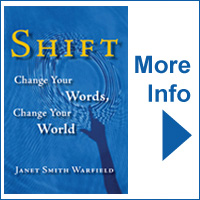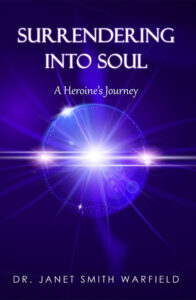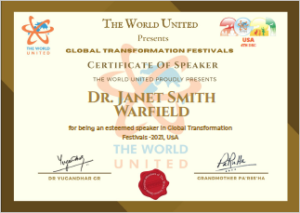![]()

How It All Began
Forty-five years ago I had a mystical experience. I wasn’t looking for it. I wasn’t trying to achieve it. It just happened. I know it was a mystical experience, because it fit the four marks of a mystical experience that William James describes so well in his book “The Varieties of Religious Experience”.
Those marks are:
1. Ineffability. (Words can’t adequately describe it.)
2. Noetic quality. (Knowledge or comprehension.)
3. Transiency. (It doesn’t last.)
4. Passivity. (Will power doesn’t make it happen.)
Initially, I had no vocabulary with which to express this mystical experience. My Unitarian rearing hadn’t recognized mystical experiences. How could that rearing have given me words to describe it or communicate it?
To find ready-made vocabularies, I had to explore other religious traditions. How interesting that each religious tradition had developed its own vocabulary, and they were all different. It was just like all the different languages that had developed in the world. All communicated experience. All the words were different.
Word Sculptures of a Mystical Experience
I don’t remember who came to my door. I don’t remember what he said. I do remember he was angry.
I had just finished reading a book called Summerhill by an English schoolmaster, A.S. Neill. Its theme was freedom, not license. Each student in Neill’s school was free to do what he wanted as long as the conduct didn’t hurt someone else. The community Neill had created was a free, creative, loving, respectful, responsible interaction of unique human beings.
Recently, I’d been involved in disciplinary battles with my preschool sons. The battles resulted in increasingly destructive behavior in them and increased frustration in me. I decided to give Neill’s methods a try, with my own children and with other people in my life.
The man at the door wasn’t hurting me. I decided to allow him to vent his anger. I didn’t do it because it was something I ought to do. I did it because I chose to do it. I experienced acceptance of the anger and no desire to retaliate. Suddenly, the anger stopped.
Nothing changed. My house, the door, the living room, the man, were all still there, just as they had been five minutes before.
Yet everything changed. Suddenly, I understood the meaning of words I’d been taught as a child: “But I say unto you, that ye resist not evil; but whosoever shall smite thee on thy right cheek, turn to him the other also.” Matthew 5:39.
I couldn’t stop playing with these ideas. Was my life the same or was it different? Did I know or did I know nothing? I wasn’t sure.
My five-year-old son Bill began wetting the bed after his youngest brother was born. At first, I ignored the bedwetting. Perhaps it would disappear on its own. When it didn’t, I explained to him why he was too big a boy to wet the bed. The wetting continued. I reasoned with him, threatened him, screamed at him, and spanked him. The wetting continued. I felt angry and frustrated.
Neill frequently dealt with problem behavior by rewarding his students. While rewards for bad behavior didn’t make sense, nothing else had worked. Neill’s ideas had worked with the man at the door. I decided to try them with the bedwetting problem.
The next time Bill wet the bed, I gave him a penny. He stared at me in confusion. The following morning, his bed was dry. He never wet it again. My anger and frustration disappeared.
What a powerful tool! I began using Neill’s ideas with neighboring children.
One day, two children were calling each other names in the back yard and threatening to fight. Instead of trying to stop them, I took each aside and asked him if he wanted to fight.
“I don’t want to fight,” each responded, “but he’s making me do it. He’s calling me names.”
“Do you want to fight?” I reiterated. “If so, go ahead and do it.”
The boys mumbled to themselves and looked at the ground. Two minutes later, they were happily playing together.
What I was doing contradicted everything society had taught me, but it brought the peace and harmony I desired. Society had taught me to punish people for bad behavior, but I didn’t punish them. Society had taught me to resist evil, but I no longer resisted. Society had taught me to fight for peace, but I didn’t fight.
Instead, I simply detached from the anger and turmoil around me and allowed it to happen without responding to it. The anger and turmoil dissipated, and my life and relationships worked. By allowing myself to remain peaceful and harmonious, everything around me became peaceful and harmonious.
I had always understood Matthew 5:39 as an unattainable moral commandment, requiring subservience of my own needs to the needs of others. It wasn’t that at all. It was extremely effective action I could take all by myself, that benefited both me and others. There was no self-denial in that action. There was nothing but self-affirmation and life affirmation. I had never before felt so free, so strong, so powerful, so integrated, so fully in control.
Nothing outside me changed. The only thing that changed was my own thoughts, actions, and emotions.
What I experienced has been called a “mystical experience”. As a child, I had been taught to doubt, question, and trust my own judgment. My upbringing didn’t include education about mystical experiences, but I knew these experiences dominated many religions. As I read William James’ “Varieties of Religious Experience”, and texts from Christianity, Buddhism, Zen Buddhism, Confucianism, Taoism, Islam, Hinduism, Plato, and existentialist philosophers, I could recognize my own experience in all the different words.
It was as if different people were describing the same beautiful flower garden. Some talked about roses, some spoke of delphiniums, some noticed the color patterns, some focused on the trellises and paths. If I hadn’t seen the flower garden and were just listening to the words, I would have thought the people were talking about different things. Having seen the flower garden, I knew they were all giving verbal structure and form to the same underlying experience, just as our minds give form and meaning to the fixed lines of optical illusions.
Are the religious words true, or is each set of words simply a finger pointing toward the moon? Is there a sense in which words are false idols? Does the meaning of each set of words depend on the human consciousness that hears them and uses them?
The last great frontier is shifting human consciousness. Peace will happen only when each of us takes responsibility for creating it in our own lives.
IT IS ALL VERY SIMPLE
Each of us has only one soul to fix …
Each of us has only one heart to heal …
Each of us has only one head to clear …
| our own. |
But we need all of us.
Without one, there is disorder …
Without one, there is imperfection …
Without one, there is a hole in harmony …
| no whole. |
It is all very simple.
We all matter.





